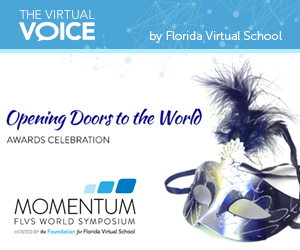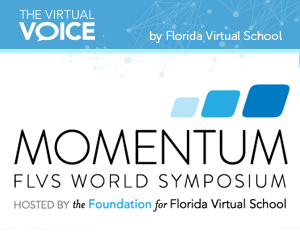Professional Development
Premier Events Sponsored by The Foundation for FLVS
By Guest Blogger on November 12th, 2014
 This fall, The Foundation for Florida Virtual School (The Foundation), the philanthropic organization of FLVS, “Unmasked the Future of Education” by hosting two premier events: the third annual Opening Doors to the World Awards Celebration and the inaugural users conference, Momentum: FLVS World Symposium. Both of these events shined a spotlight on education leaders who are helping to shape the future of online learning in the United States.
This fall, The Foundation for Florida Virtual School (The Foundation), the philanthropic organization of FLVS, “Unmasked the Future of Education” by hosting two premier events: the third annual Opening Doors to the World Awards Celebration and the inaugural users conference, Momentum: FLVS World Symposium. Both of these events shined a spotlight on education leaders who are helping to shape the future of online learning in the United States.
Momentum: FLVS World Symposium, presented by Mawi Learning, was a three-day users conference that provided more than 2,000 industry professionals the opportunity to network and collaborate with education experts, exhibitors, and innovators from all over the country. Conference keynotes featured the best of the best with Mawi Asgedom of Mawi Learning, Ian Jukes of 21st Century Project, and Dan Heath, New York Times Best Selling author. Continue reading
Momentum: FLVS World Symposium Recap
By Guest Blogger on October 28th, 2014

If you have ever wondered how much fun 2,000+ educators could have at once, just attend the annual Momentum: FLVS World Symposium held in Orlando each fall. Yes, there is a ton of learning going on, and educators find that pretty thrilling. It is in their DNA! One educator summarized day one of this year’s conference as follows: “Awesome conference so far. Only one day and I already feel equipped!”
Educators across the country came to learn, participate, present, and network at the conference in early October alongside Florida Virtual School staff. This collaborative learning experience benefited all who attended. As one FLVS staff member highlighted, “Love the idea of presenters outside of FLVS. Lets us know what is going on outside our world.” Continue reading
Applying High School Experience to Career
By Guest Blogger on September 5th, 2014
 Many high school students face the daunting task of applying for their very first paid job with zero experience and very little preparation. Here are a few simple tips to help you translate your high school experience (volunteering, participating in clubs, playing sports, etc.) to a job application:
Many high school students face the daunting task of applying for their very first paid job with zero experience and very little preparation. Here are a few simple tips to help you translate your high school experience (volunteering, participating in clubs, playing sports, etc.) to a job application:
1. Everyday skills should not be taken for granted.
Top performers in school are organized and goal-oriented. Good students use proven time management skills. Club secretaries are detail-oriented. Athletes take initiative and follow directions well. FLVS students are computer whizzes! Instead of listing previous jobs on your resume, you can list clubs, sports, and even your GPA (if you’re proud of it). Just make sure to include a brief description for each item, and explain the valuable job skills you use on a regular basis for each task.
Interview Tips: Knowing When to Stop Talking
By Guest Blogger on April 11th, 2014
 Your palms are sweating. Your knees are shaking. You feel like you’re rambling. You probably are. STOP.
Your palms are sweating. Your knees are shaking. You feel like you’re rambling. You probably are. STOP.
Job interviews can be incredibly intimidating. You sit across the table from high-level executives and try to prove your worth. In behavioral-based interviews, you are asked several specific, action-driven questions. Your interviewers want to know the details of specific instances when you applied your natural talents and learned skills to unite stakeholders, lead teammates, and solve challenges.
The first problem you face is you’re drawing a blank. Funny, I can’t think of a single time I ever spoke to a single customer or solved a single problem… Continue reading
Learning Forward – Part 8: Lesson Study
By Mary Mitchell on October 15th, 2013
The lesson study process is one of the most unique teaching techniques available to 21st century teachers. During a lesson study, instructors present a lesson and uncover what makes it effective or ineffective. Bringing several teachers together and using their combined knowledge to create, teach, and reflect on a lesson is one of the best teaching strategies for instructors. Teachers are life-long learners and are always looking for ways to improve their skills. Lesson study is an ideal format to observe what does and doesn’t work and make improvements. Continue reading
Learning Forward – Part 7: Action Research
By Mary Mitchell on September 4th, 2013

Photo credit: http://www.learningforward.org/
Action Research is a professional’s systematic, intentional study of their own classroom and workplace practices. Teachers who collaborate and reflect have a direct impact on student achievement.
This form of professional development takes teachers beyond their own classroom and into each other’s. Action research definitely makes for a great Professional Learning Community (PLC). Continue reading
Learning Forward – Part 6: Professional Learning Communities
By Mary Mitchell on August 5th, 2013
Continuing my series on the Professional Learning standards, today’s blog post focuses on Professional Learning Communities. A Professional Learning Community (PLC) consists of educators committed to working collaboratively in an ongoing process of collective inquiry and action research to achieve better results for the students they serve. PLCs are intended to improve student learning by providing continuous job-embedded learning opportunities for educators. A PLC utilizes data to identify gaps between learning goals and actual student achievement. Then, through action research, a PLC develops action items to make corrective changes. Continue reading
Learning Forward – Part 5: Outcomes
By Mary Mitchell on June 27th, 2013
Throughout my blog series on Professional Learning standards, we’ve unpacked the core elements of the following standards: Learning Communities; Leadership, Resources, and Data; and Learning Design and Implementation. Now I would like to look at Outcomes and take this standard from paper to practice. Continue reading
Learning Forward – Part 4: Learning Design and Implementation
By Mary Mitchell on May 30th, 2013
In my previous posts, we unpacked the core elements of the first four Standards for Professional Learning released by Learning Forward — Learning Communities, Leadership, Resources, and Data. Now I would like to take a look at the next two standards: Learning Design and Implementation. Continue reading
Learning Forward – Part 3: Leadership, Resources, Data
By Mary Mitchell on April 22nd, 2013
Now that we have unpacked the core elements of Learning Communities (view the previous post here), let’s move into the next three standards: Leadership, Resources, and Data.
The Leadership Standard states: “Professional learning that increases educator effectiveness and results for all students requires skillful leaders who develop capacity, advocate, and create support systems for professional learning.” Continue reading

